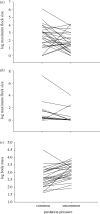Relaxed predation risk reduces but does not eliminate sociality in birds
- PMID: 20106860
- PMCID: PMC2936213
- DOI: 10.1098/rsbl.2009.1063
Relaxed predation risk reduces but does not eliminate sociality in birds
Abstract
Disentangling the relative contribution of predation avoidance and increased foraging efficiency in the evolution of sociality in animals has proven difficult given that the two types of benefits often operate concurrently. I identified different types of refuges from predation in birds related to morphological and ecological traits, providing an opportunity to examine concomitant changes in sociality over evolutionary times. Results of a matched-species comparative analysis indicated a reduction in the size of foraging or non-foraging groups but not complete disappearance under negligible predation risk. The results suggest that while predation avoidance is an important component in the evolution of sociality in birds, it is most probably not acting alone but rather in conjunction with other benefits such as increased foraging efficiency.
Figures
References
-
- Arnold K. E., Owens I. P. F.1999Cooperative breeding in birds: the role of ecology. Behav. Ecol. 10, 465–471 (doi:10.1093/beheco/10.5.465) - DOI
-
- Beauchamp G.1999The evolution of communal roosting in birds: origins and secondarily losses. Behav. Ecol. 10, 675–687 (doi:10.1093/beheco/10.6.675) - DOI
-
- Beauchamp G.2004Reduced flocking by birds on islands with relaxed predation. Proc. R. Soc. Lond. B 271, 1039–1042 (doi:10.1098/rspb.2004.2703) - DOI - PMC - PubMed
-
- Bélisle M.1998Foraging group size: models and a test with jaegers kleptoparasitizing terns. Ecology 79, 1922–1938
-
- Blumstein D. T., Daniel J. C.2005The loss of anti-predator behaviour following isolation on islands. Proc. R. Soc. B 272, 1663–1668 (doi:10.1098/rspb.2005.3147) - DOI - PMC - PubMed
Publication types
MeSH terms
LinkOut - more resources
Full Text Sources


